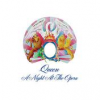 Originally published by L.S. Media. March 20th 2011.
Originally published by L.S. Media. March 20th 2011.
For some, the height of Queen’s studio achievements was the fourth album, A Night at the Opera. Released in the November of 1975, the album is the epitome of excellent lyric writing, musical themes to die for, that number one record and ultimate promotion technique.
The previous three albums had done well both critically and commercially, with the band seemingly refusing to be pigeon holed into any particular category which would be the downfall of many of the bands that tried to follow in their wake. The first three albums had the distinction of being the unequivocal debut, the safe dalliance with the world of Progressive Rock and then with the pure Rock sound of Sheer Heart Attack. A Night at the Opera turned the press and public who tried to place them square into one genre on their heads.
Named after a Marx Brothers film of the same name, A Night at the Opera is one of high drama and incredible musicianship, where the songs are not just the elements that fill the record but are incredible moments of beauty within themselves, each song heavily crafted, sweated over and played as if the bands future relied upon it being the best album ever recorded.
The album opens with the sarcastic and bitter Death on Two Legs (dedicated to…) which is unlike anything the band had done before, its vitriolic sentiments aimed at a certain person of their acquaintance, hit a nerve with the fans who could hear upon listening to the track that Queen may be fun to listen to, they may create very cool music but they were not a band to ever get on the wrong side of.
From that moment the album’s possible perspective changes and Freddie’s sweet nature and playful side come back into view with the 1920’s sounding Lazing on a Sunday Afternoon, its mischievous nature shining through such lines as “I’m bound to be proposing on a Saturday night” to wonderful effect.
For the first time bass player John Deacon is able to shine brightly as a member of the band when Queen released his engaging and delightful You’re My Best Friend as a follow up single to the beast of a track, much played, much loved, much parodied Bohemian Rhapsody. The two tracks couldn’t be more different in their style or presentation but both became huge hits for the band, the latter not only in 1975/76 but also as a re-release after the Freddie’s death.
Bohemian Rhapsody is nothing like anything else ever recorded before or since, a truly unique experience which has, if possible, been enhanced by the remastering process. With three main sections to the song and no chorus, on paper it shouldn’t work, its concept to wild and incredible to even venture but Queen and especially Freddie Mercury make it happen. No words can describe how, it just does!
A Night at the Opera was the band’s first number one album and once more going platinum selling. Other Queen albums would sell just as well, they would be received as well but they wouldn’t retain the same affection in music lover’s hearts. Its achievement as a conceptual art should forever place it amongst Pink Floyd’s The Wall and Genesis’s The Lamb Lies down on Broadway as the very pinnacle of seventies rock music.
Ian D. Hall
